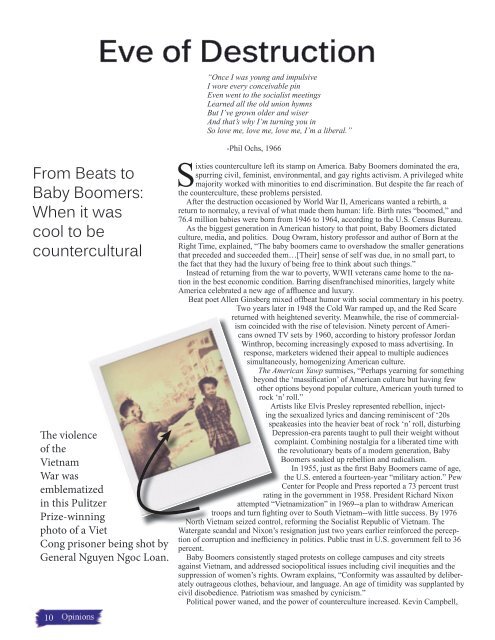About that Vaccination...
Create successful ePaper yourself
Turn your PDF publications into a flip-book with our unique Google optimized e-Paper software.
Eve of Destruction<br />
“Once I was young and impulsive<br />
I wore every conceivable pin<br />
Even went to the socialist meetings<br />
Learned all the old union hymns<br />
But I’ve grown older and wiser<br />
And <strong>that</strong>’s why I’m turning you in<br />
So love me, love me, love me, I’m a liberal.”<br />
-Phil Ochs, 1966<br />
From Beats to<br />
Baby Boomers:<br />
When it was<br />
cool to be<br />
countercultural<br />
The violence<br />
of the<br />
Vietnam<br />
War was<br />
emblematized<br />
in this Pulitzer<br />
Prize-winning<br />
photo of a Viet<br />
Cong prisoner being shot by<br />
General Nguyen Ngoc Loan.<br />
10<br />
Sixties counterculture left its stamp on America. Baby Boomers dominated the era,<br />
spurring civil, feminist, environmental, and gay rights activism. A privileged white<br />
majority worked with minorities to end discrimination. But despite the far reach of<br />
the counterculture, these problems persisted.<br />
After the destruction occasioned by World War II, Americans wanted a rebirth, a<br />
return to normalcy, a revival of what made them human: life. Birth rates “boomed,” and<br />
76.4 million babies were born from 1946 to 1964, according to the U.S. Census Bureau.<br />
As the biggest generation in American history to <strong>that</strong> point, Baby Boomers dictated<br />
culture, media, and politics. Doug Owram, history professor and author of Born at the<br />
Right Time, explained, “The baby boomers came to overshadow the smaller generations<br />
<strong>that</strong> preceded and succeeded them…[Their] sense of self was due, in no small part, to<br />
the fact <strong>that</strong> they had the luxury of being free to think about such things.”<br />
Instead of returning from the war to poverty, WWII veterans came home to the nation<br />
in the best economic condition. Barring disenfranchised minorities, largely white<br />
America celebrated a new age of affluence and luxury.<br />
Beat poet Allen Ginsberg mixed offbeat humor with social commentary in his poetry.<br />
Two years later in 1948 the Cold War ramped up, and the Red Scare<br />
returned with heightened severity. Meanwhile, the rise of commercialism<br />
coincided with the rise of television. Ninety percent of Americans<br />
owned TV sets by 1960, according to history professor Jordan<br />
Winthrop, becoming increasingly exposed to mass advertising. In<br />
response, marketers widened their appeal to multiple audiences<br />
simultaneously, homogenizing American culture.<br />
The American Yawp surmises, “Perhaps yearning for something<br />
beyond the ‘massification’ of American culture but having few<br />
other options beyond popular culture, American youth turned to<br />
rock ‘n’ roll.”<br />
Artists like Elvis Presley represented rebellion, injecting<br />
the sexualized lyrics and dancing reminiscent of ‘20s<br />
speakeasies into the heavier beat of rock ‘n’ roll, disturbing<br />
Depression-era parents taught to pull their weight without<br />
complaint. Combining nostalgia for a liberated time with<br />
the revolutionary beats of a modern generation, Baby<br />
Boomers soaked up rebellion and radicalism.<br />
In 1955, just as the first Baby Boomers came of age,<br />
the U.S. entered a fourteen-year “military action.” Pew<br />
Center for People and Press reported a 73 percent trust<br />
rating in the government in 1958. President Richard Nixon<br />
attempted “Vietnamization” in 1969--a plan to withdraw American<br />
troops and turn fighting over to South Vietnam--with little success. By 1976<br />
North Vietnam seized control, reforming the Socialist Republic of Vietnam. The<br />
Watergate scandal and Nixon’s resignation just two years earlier reinforced the perception<br />
of corruption and inefficiency in politics. Public trust in U.S. government fell to 36<br />
percent.<br />
Baby Boomers consistently staged protests on college campuses and city streets<br />
against Vietnam, and addressed sociopolitical issues including civil inequities and the<br />
suppression of women’s rights. Owram explains, “Conformity was assaulted by deliberately<br />
outrageous clothes, behaviour, and language. An age of timidity was supplanted by<br />
civil disobedience. Patriotism was smashed by cynicism.”<br />
Political power waned, and the power of counterculture increased. Kevin Campbell,




